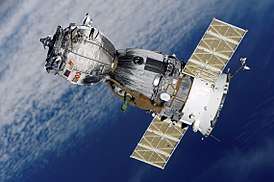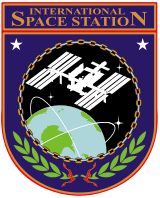Soyuz MS-10
.jpg) Launch of the Soyuz-FG rocket carrying the MS-10 spacecraft | |
| Operator | Roskosmos |
|---|---|
| Mission duration | 36 minutes[1] |
| Orbits completed | Failed to orbit |
| Spacecraft properties | |
| Spacecraft type | Soyuz-MS 11F747 |
| Manufacturer | RKK Energia |
| Crew | |
| Crew size | 2 |
| Members |
Aleksey Ovchinin Nick Hague |
| Callsign | Burlak |
| Start of mission | |
| Launch date | 11 October 2018[2][3] |
| Rocket | Soyuz-FG |
| Launch site | Baikonur Pad 1/5 |
| End of mission | |
| Landing date | 11 October 2018 |
| Landing site | 20 km east of Jezkazgan, Kazakhstan |
|
Soyuz programme (Manned missions) | |
Soyuz MS-10 was a manned Soyuz MS spaceflight which aborted shortly after launch on 11 October 2018[2][3] due to a failure of the Soyuz booster rocket.[4][5] MS-10 was the 139th flight of a Soyuz spacecraft. It was intended to transport two members of the Expedition 57 crew to the International Space Station. A few minutes after liftoff, the craft went into contingency abort due to a booster failure and had to return to Earth. Both crew members, Roscosmos cosmonaut Aleksey Ovchinin and NASA astronaut Nick Hague, were recovered alive in good health.[4] The MS-10 flight abort was the first instance of a Russian manned booster accident at high altitude in 43 years, since Soyuz 18a similarly failed to make orbit in April 1975.[5]
Crew
| Position | Crew member | |
|---|---|---|
| Commander | Expedition 57 Second spaceflight | |
| Flight Engineer 1 | Expedition 57 First spaceflight | |
Backup crew
| Position[6] | Crew member | |
|---|---|---|
| Commander | ||
| Flight Engineer 1 | ||
Mission
Launch and abort
_(cropped)_3.jpg)
A few minutes after liftoff, which took place at 08:40 UTC, the crew reported feeling weightless, and mission control declared a booster had failed. According to Sergei Krikalyov of Roscosmos, the primary cause of the failure was a collision that occurred during the separation of the carrier rocket’s first and second stages. "A deviation from the standard trajectory occurred and apparently the lower part of the second stage disintegrated," he said.[7] Shortly after, a contingency was declared and the spacecraft carrying the crew performed an emergency separation, returning to Earth in a ballistic trajectory, during which the crew experienced "about six to seven times Earth's gravity" followed by a successful landing.[8] The abort occurred at an altitude of approximately 50 kilometres (31 miles).[9]
Recovery
.jpg)
At 08:55 UTC the search and rescue team was deployed to recover the crew and the spacecraft which had landed 402 kilometres (250 mi) from the launch site and 20 kilometres (12 mi) east of Jezkazgan, Kazakhstan.[10] Approximately 25 minutes after the search and rescue team took off, NASA announced they were in contact with Ovchinin and Hague. NASA TV broadcast photographs of the crew undergoing medical tests and apparently healthy at Jezkazgan Airport at 12:04 UTC.[11] The crew flew to the Baikonur Cosmodrome to meet their families[12] before leaving for Moscow.[13]
Aftermath
Following the aborted spaceflight, the Russian government announced that all future manned Soyuz launches would be suspended. Roscosmos announced that it had started a full state investigation into the incident.[14] Roscosmos ordered a state commission to investigate the incident, and a criminal investigation is also expected, according to the BBC.[15] Another investigation had commenced a few weeks previously into how a hole came to be drilled into the wall of the Soyuz MS-09 capsule that is now docked at the space station.[16]
The current crew of the International Space Station has been informed of the failed flight (according to NASA live voice-over). The ISS crew can return safely in the Soyuz MS-09 capsule, but only until about late-December 2018, due to the limited lifespan of "about 200 days" of the Soyuz capsule; under existing plans, they would have to leave by mid-December.[17] If the investigation concludes with the grounding of the Soyuz, the ISS may be abandoned until the Commercial Crew Program receives proper certification; this may result in the lack of maintenance of the ISS, but "ground controllers could keep it up and running for a while".[18] Dimitry Rogozin, chief of Roscosmos, said that the crew are planned to fly next spring. [19]
Gallery

See also
References
- ↑ Chow, Denise (October 11, 2018). "Soyuz astronauts' emergency descent was a harrowing, high-G ordeal". NBC News.
- 1 2 NASA (17 September 2018). "Expedition 57". Retrieved 20 September 2018.
- 1 2 Pietrobon, Steven (5 February 2017). "Russian Launch Manifest". Retrieved 12 February 2017.
- 1 2 Garcia, Mark (11 October 2018). "Crew in Good Condition After Booster Failure". NASA Space Station. Retrieved 11 October 2018.
- 1 2 Harwood, William (11 October 2018). "Soyuz crew lands safely after emergency launch abort". Spaceflight Now. Retrieved 12 October 2018.
- ↑ Spacefacts.de (20 May 2018). "Manned Spaceflight Launch and Landing Schedule". Retrieved 29 May 2018.
- ↑ "Roscosmos reveals cause for Soyuz launch failure". AzerNews. 12 October 2018. Retrieved 14 October 2018.
- ↑ Hodge, Nathan; Smith-Spark, Laura (11 October 2018). "Astronauts survive Soyuz rocket emergency landing". CNN. Retrieved 12 October 2018.
- ↑ "Soyuz MS-10 makes emergency landing after a launch failure". russianspaceweb.com. Retrieved 12 October 2018.
- ↑ Bridenstine, Jim [@JimBridenstine] (11 October 2018). "@NASA astronaut Nick Hague and Russian cosmonaut Alexey Ovchinin are in good condition following today's aborted launch. I'm grateful that everyone is safe. A thorough investigation into the cause of the incident will be conducted. Full statement below: …" (Tweet) – via Twitter.
- ↑ NASA Live: Official Stream of NASA TV NASA TV, 11 October 2018.
- ↑ Expedition 57 Crew Returns to Baikonur (NHQ201810110007) NASA at Flickr, 11 October 2018.
- ↑ @Ruptly (11 October 2018). "*EXCLUSIVE* #SoyuzMS10 crew departs Baikonur for Moscow" (Tweet) – via Twitter.
- ↑ "Astronauts escape malfunctioning Soyuz rocket". BBC News. 11 October 2018. Retrieved 11 October 2018.
- ↑ "Investigation starts into dramatic Soyuz rocket breakdown". BBC News. 12 October 2018. Retrieved 13 October 2018.
- ↑ Sample, Ian (11 October 2018). "Rocket launches to be grounded while mid-air failure is investigated". The Guardian. Retrieved 11 October 2018.
- ↑ Wall, Mike (11 October 2018). "Empty Space Station? NASA Prepares for the Worst (but Hopes for the Best) After Soyuz Abort". Space.com.
- ↑ Foust, Jeff (11 October 2018). "NASA to look at options to keep crew on ISS while Soyuz grounded". SpaceNews.
- ↑ https://www.youtube.com/watch?v=RhJb5m0bDQc&feature=youtu.be&t=227
External links




